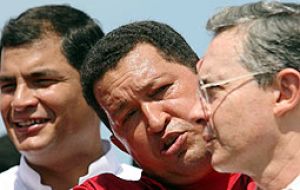MercoPress. South Atlantic News Agency
All eyes on Ecuador's reforms debate and squabbling neighbors
 Pte. Correa next to his counterparts Chavez and Uribe before smiles soured
Pte. Correa next to his counterparts Chavez and Uribe before smiles soured Confronted Colombia and Venezuela presidents Alvaro Uribe and Hugo Chavez will have to act politely on Friday if they cross each other during the official inauguration of Ecuador's constitutional assembly seated in Ciudad Alfaro, 500 kilometers from the capital Quito.
The two presidents who exchanged serious allegations and coarse language following the collapse of peace talks with Colombia's main rebel group, have confirmed together with Brazil's Lula da Silva and Bolivia's Evo Morales their participation in the ceremony to be hosted by President Rafael Correa. Chavez who was mediating in negotiations for the humanitarian exchange of Colombian government held prisoners for FARC hostages was left aside by Uribe when the Venezuelan president spoke directly to Colombian Army commanders. Chavez later said that while Uribe was president relations with Colombia will be interrupted. The formal opening of the constitutional assembly will take place in Ciudad Alfaro. On Thursday the assembly over which president Correa has a contrive majority held its first session to elect authorities and agree on internal rules and procedures. Correa, elected last year as a political outsider promising a citizens' revolution, wants the assembly to curb the powers of discredited traditional parties and beef up state control over the economy. The US trained economist is popular for taking on elites many Ecuadorians blame for the instability that has toppled three presidents in a decade. But his promises to restructure debt, heavy spending and a flagging economy have investors on edge. "This citizens' revolution is a process that will bring about deep reforms in Ecuador," said Alberto Acosta, a Correa ally who was named president of the 130-member assembly. The assembly has six months to draft a new constitution with the option of a 60-day extension. Some pro-government members have said Congress, currently on recess, should close until the charter is drafted and put to a national referendum. Opposition lawmakers have vowed to stay in office while others say they could take action in international courts. Correa handed in his resignation to the assembly in a symbolic move to show his independence from members, though the assembly is certain to ratify his presidency. A splintered opposition with only a few seats in the assembly says Correa wants to consolidate his presidential powers as Chavez did in Venezuela after his 1998 election. In related news President Correa fired the chief of Ecuador's state-run oil company on Thursday after days of protests cost Petroecuador millions of dollars in lost production. Ecuador is the fifth largest oil producer in South America with a daily production of almost half a million barrels. Te country recently applied to be again admitted in OPEC. Petroecuador president Carlos Pareja was replaced by navy Rear Admiral Fernando Zurita, the presidential palace said in a statement. "What we are looking for with the change is to give greater efficiency to Petroecuador. There are many actions that haven't been taken that would have benefited the company" said Energy and Mines Minister Galo Chiriboga. "The decision was also influenced by protests in Orellana that have cost around 30,000 barrels of crude oil." Dozens of protesters took over oil fields in Ecuador's eastern jungle starting Monday, demanding jobs, paved roads and electricity. The protesters reportedly cut communication lines at Petroecuador's Auca Sur and four other fields, and threw a stick of dynamite at one of the pumps, but there were no reports of injuries. Production losses at Auca Sur are costing Petroecuador 3 million US dollars a day, according to company officials. President Correa in an interview criticized the protesters for attacking the country's most important resource. "We cannot let 30, 40 people threaten the wealth that sustains all Ecuadorians" he underlined.




Top Comments
Disclaimer & comment rulesCommenting for this story is now closed.
If you have a Facebook account, become a fan and comment on our Facebook Page!